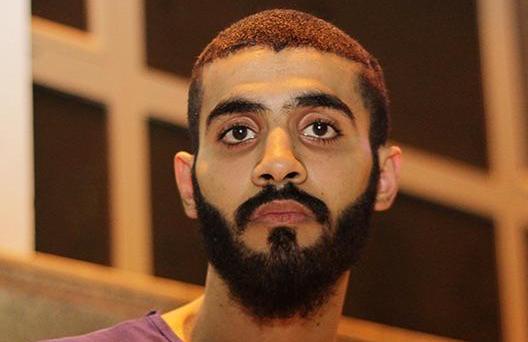Rajaie Ali Baddaw was only a 21-year-old, who graduated from high school and was waiting to get into university, when he was arrested. Rajaie was subjected to multiple human rights violations including severe beatings, undressing, sexual harassment, ill-treatment, threats, and other degrading acts. Rajaie is the brother of Mohsen and Mohamed Baddaw, who were both sentenced to life in prison. He is currently held in Jau Prison, Building 14.
On 15 September 2015, Rajaie was warrantlessly arrested after he left the mosque by officers in civilian clothing who came out of a car driving behind him. They ran after him, surrounded him, and threw him on the floor. They threatened to kill him by pointing a gun at his head. Rajaie was arrested for his participation in anti-government marches. His family has long been the target of sudden raids and forced house break-ins by civil, riot, and police forces. These raids were carried out to arrest Rajaie and his brothers Mohsen and Mohamed.
At 11 pm, Rajaie called his family to inform them of his arrest and that he is held at the investigations (CID). Rajaie’s family did not know anything about his whereabouts or wellbeing for a week after the arrest. He was only able to meet them a month after the arrest.
After his arrest, Rajaie was taken to the Budaiya police station and was forced to take off his trousers. His hands and legs were tied, and the officers hung him on the door with his head down. They beat him until he passed out, then poured cold water on him. Rajaie sustained traces and bruises from the torture, but he was given an ointment to cover them so that they did not show when his parents visited him. He asked for a doctor, but his request was denied. His parents and lawyer were not allowed to see him during the interrogation, and his family only met with him a month after his arrest. Under this torture, Rajaie confessed to the charges raised against him.
Rajaie was charged in multiple cases of illegal assembly and rioting due to his participation in peaceful demonstrations. He was denied access to his lawyer and did not have enough time to prepare for his trial. The false and forced confessions he made were used against him, and he was sentenced to life imprisonment. Rajaie’s family has submitted complaints to the Ombudsman Office and the National Institute for Human Rights regarding the mistreatment he has been subjected to, but to no avail.
After the spread of the Coronavirus in Jau Prison, Rajaie and his brothers were subjected to harassment under the pretext of precautionary measures. Visits were canceled and replaced with irregular and short video calls. Rajaie was also denied the right to buy personal and hygienic products and prohibited from going out to the yard. He was kept in his prison cell for long periods. The prisoners were also deprived of healthy meals and sanitation kits. Rajaie had to go on contact and hunger strikes to demand his basic rights. In retaliation, he was punished by being placed in solitary confinement. After the riot forces attacked prisoners in Building 12 who protested against medical negligence in prison following the death of Abbas MalAllah, the situation further deteriorated. Rajaie was unable to contact his family for 23 days.
The actions perpetrated by the Bahraini government against Rajaie all constitute violations of the Bahraini Constitution and International Law including treaties to which Bahrain is a signatory such as the Convention against Torture and Other Cruel, Inhuman or Degrading Treatment or Punishment (CAT) and the International Covenant on Civil and Political Rights (ICCPR). The medical negligence and inhumane treatment Rajaie has faced after the outbreak of Coronavirus in prison are in further violation of the Mandela Rules. ADHRB calls on the Bahraini Government to drop the unfounded charges against Rajaie and release all political prisoners, especially amidst the fatal COVID-19 pandemic.





